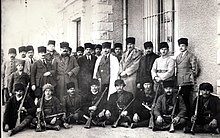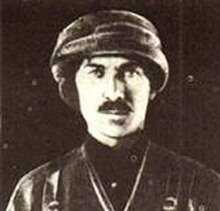Çerkez Ethem

Çerkez Ethem ( Ottoman شركس ادهم; in German: Ethem der Tscherkesse ; * 1883 / 1884 in Bandırma , Ottoman Empire ; † October 7, 1949 in Amman , Jordan ) was an Ottoman- Circassian guerrilla leader and fighter in the Turkish War of Independence .
He was born the youngest of five sons in the village of Emre in Bandırma district, the son of a miller. His family belonged to the Circassians from the Schapsugen tribe , who found protection in the Ottoman Empire after the Russians had conquered their Caucasian homeland . The two oldest brothers, Ethems, İlyas and Nuri, were killed while fighting with bandits. His two other brothers, Reşit and Tevfik, began military training and graduated from military school in 1901/1902. Ethem himself also took up military training. He fought in the Balkan Wars and later during the First World War as a member of the Teşkilât-ı Mahsusa in covert operations in Iraq and Afghanistan. He returned home after being wounded.
When the Ottoman Empire lost the war and was occupied, resistance groups formed. Ethem and his two brothers fought against the Greek occupiers in Western Anatolia and founded the Kuvva-yı Seyyare (German: Mobile Forces ) in 1919 . He joined Ataturk's resistance movement in Ankara and became part of the Kuvayı Milliye - an association of many irregular troops. Under the command of Ali Fuat Cebesoy , he fought in the Greco-Turkish War and distinguished himself. In addition to fighting the occupiers, he also put down internal uprisings against Ataturk, for example in Bolu, Düzce and against Ahmet Aznavur. He killed some leaders without consulting Ankara, which caused anger in Ankara. Also in the Yozgat uprising of Çopur Musa in 1920, the leadership in Ankara asked him to intervene. This time too, Ethem was able to put down the uprising, which made it more popular.
Çerkez Ethem was not averse to Leninist ideas and joined the Yeşil Ordu Cemiyeti , a left-wing group in parliament. His 700 strong battalion was therefore also called "Bolshevik Battalion". In addition, with the appointment of İsmet İnönü as commander of the Western Front, personal problems arose and the conflict between Ethem and Ankara intensified. Ethem was asked by Ankara to subordinate its irregular units to the army. He refused and there was armed fighting. After a defeat by the Turkish army on December 29, 1920 near Kütahya , Ethem fled with his brothers and men on January 5, 1921 behind the Greek front line. The Ankara government declared the three brothers traitors and banished them. As persona non grata , the three were part of the 150 people (tr: Yüzellilikler ) who were not allowed to return to Turkey after the Treaty of Lausanne in 1923. Then the brothers first went to Greece, then Germany and on through some Arab countries before they finally landed in Amman in Jordan. In 1935 they were placed under house arrest there for allegedly planning an assassination attempt on Ataturk .
In 1937 the parliament in Turkey issued an amnesty for the brothers. Ethem refused on the grounds that he had never been a traitor and therefore did not need an amnesty. His two brothers later returned to Turkey. Ethem himself died on October 7, 1949 in Amman of head and neck cancer . His brother Reşit returned to Turkey in 1950 and died there a year later. Tevfik died in 1938 after returning to Turkey.
Individual evidence
- ^ Gareth Jenkins: Political Islam in Turkey , Palgrave Macmillan, 2008, p. 88.
swell
- The Encyclopaedia of Islam. New Edition , article Čerkez Edhem by DA Rustow
| personal data | |
|---|---|
| SURNAME | Çerkez Ethem |
| ALTERNATIVE NAMES | شركس ادهم |
| BRIEF DESCRIPTION | Ottoman-Circassian soldier and guerrilla leader, resistance fighter |
| DATE OF BIRTH | 1883 or 1884 |
| PLACE OF BIRTH | Emre village near Bandırma , Ottoman Empire |
| DATE OF DEATH | October 7, 1949 |
| Place of death | Amman , Jordan |
